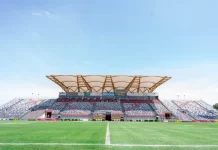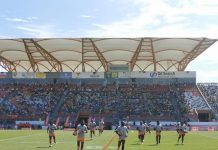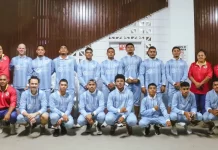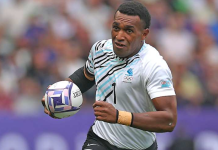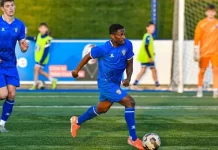Phase one of the new Scott Robertson era has begun successfully, albeit not without its drama in a series sweep of England.
Now it’s on to the next in San Diego and an entirely new challenge against Fiji.
After keeping changes to a minimum between the first Test in Dunedin and second in Auckland, Robertson has already confirmed that his match-day squad for next Saturday afternoon’s match at the Snapdragon Stadium will be different.
How much so we will see on Thursday but it’s highly likely there will be changes all over the park.
Robertson will probably shuffle his front row, with hooker Asafo Aumua likely to get a start, along with prop Fletcher Newell, after the pair had to be content with bench roles over the past fortnight.
Tupou Vaa’i will likely start in the second row – and possibly at the expense of Patrick Tuipulotu, with blindside flanker Samipeni Finau likely to be replaced, possibly by Ethan Blackadder.
The head coach could also look to change his midfield, with Anton Lienert-Brown likely to start, possibly alongside newcomer Billy Proctor. Emoni Narawa and Caleb Clarke could get chances on the wings after solid starts to the Test year by Mark Tele’a and Sevu Reece.
“A few players will get opportunities,” Robertson said Monday before the squad left for the airport.
“We wanted to keep consistency and cohesion so we could get some rhythm and understanding but now this game, this opportunity, we’ve got a great squad, great depth, some great young talent to come through.
“Now is their opportunity before we go into the Rugby Championship to show they’re here for a reason.”
Of all those who started in the first two Tests, the most scrutiny may be on Finau, centre Rieko Ioane and fullback Stephen Perofeta, the latter through no fault of his own, more due to the excellence of Beauden Barrett.
Finau, physical for the Chiefs this year, has not been as influential for the All Blacks, and could make way for Blackadder who has the potential to bring a consistently harder edge after another injury-plagued season at the Crusaders.
Blackadder was not required for either Test and could team up with Luke Jacobson, who came off the bench in both.
“Ethan is fighting fit,” Robertson said. “Holy, he’s training like he normally would. He’s at 100 and something percent so he’s good to go.”
Ioane has carried hard and tackled as bravely as he normally does but his distribution instincts probably aren’t yet where they need to be for an international No.13 and the spark brought by Lienert-Brown during the weekend’s 24-17 victory was noticeable.
Perofeta has been neat and tidy at the back but could be a victim of Barrett’s outstanding form and, furthermore, the impending return of Will Jordan from a shoulder injury.
Robertson confirmed Jordan, who has played no rugby this year, will play a couple of pre-season games for Tasman before, fitness permitting, being available for the first Rugby Championship Test against Argentina in Wellington on 10 August.
As Robertson and his fellow coaches reflect on their start to the new era, they will readily acknowledge that significant improvements are required.
Defensively, the home side will receive a comfortable pass mark, although their concession of two cross-kick tries at Eden Park is a concern.
The All Blacks’ scrum was a strength but their lineout a weakness. Try-scoring opportunities in Dunedin were at a premium, but at Eden Park two went begging in the first half; hooker Codie Taylor breaking well but failing to find Reece on the right, and Perofeta passing outside to a marked Tele’a rather than inside to an unmarked Finlay Christie.
The minimum 10 points that went unconverted would have put a different complexion on the Test.
The All Blacks’ greatest lead all series was only seven points – early at Eden Park after Tele’a stole down the blindside for his try (for one minute before England struck back via Immanuel Feyi-Waboso) – and for the final five minutes following Telea’s second and Damian McKenzie’s two penalties as the visitors searched desperately for an equaliser.
The All Blacks looked at their best when they were able to exert scoreboard pressure on the English late in the second half. Their lack of execution meant they couldn’t do it for long enough.
Fiji, ranked 10th in the world (behind the No.3-ranked New Zealand and fifth-ranked England), are unlikely to bring the same defensive intensity as the English but are likely to ask different questions – especially on attack – as Razor re-shuffles his cards.








